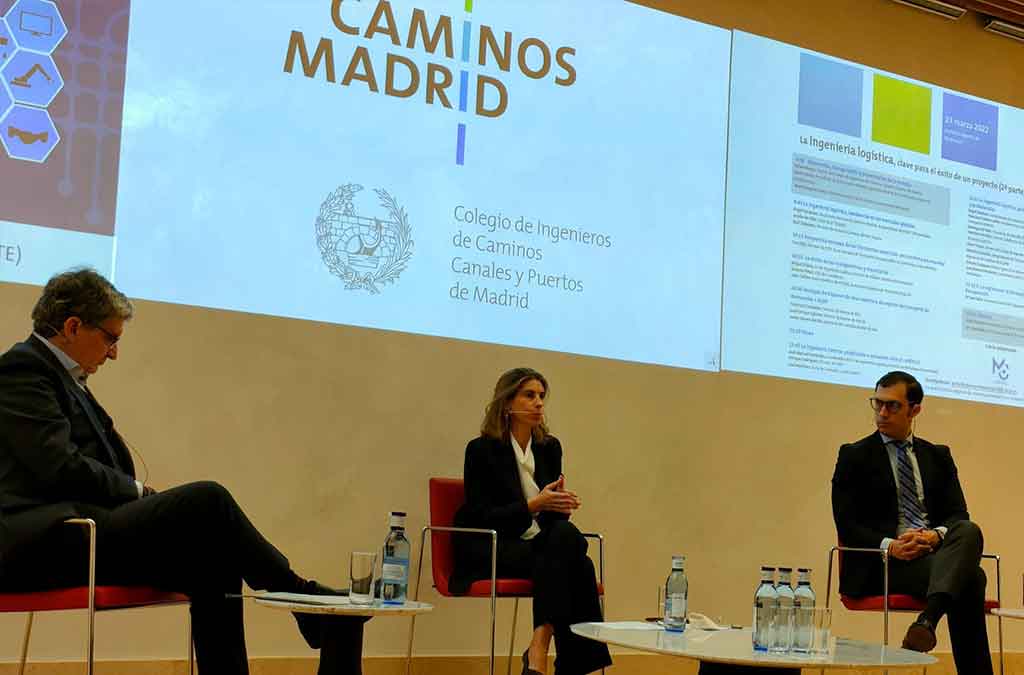The College of Civil Engineers, Canals and Ports of Madrid and the Association of Madrid World Capital of Construction, Engineering and Architecture (MWCC) today held the 2nd technical conference “Logistics Engineering, key to the success of a Project”. In this session, the transversal and singular aspects that must be incorporated in the analyzes prior to major logistics operations have been addressed with the vision of large consultants, carriers, national and international freight forwarders, legal experts and the insurance sector.
The president of Caminos Madrid, Rafael Magro, the president of MWCC, David García, and the general director of Economy of the Madrid City Council, María Ángeles Prieto, have inaugurated this conference. The president of MWCC has highlighted that “logistics engineering is more relevant than ever, it affects the daily life of citizens and as a public service our ultimate goal is to improve their quality of life”.
The General Director of the Economy pointed out the City Council’s promotion of clusters such as MWCC that “do fundamental work” and, on the subject of the conference, stressed that “we are all connected and we have to fight to improve the lives of citizens and the consumer experience”.
The day has had several discussion tables. At the table on “Logistics engineering, trends in global markets” an international vision of large consulting firms integrated in the MWCC cluster has been offered. The director of Forensics Services of PwC Spain, Raúl Salamero, has pointed out that there is a “perfect storm” for the crisis: “there has been a structural increase in demand, which is higher than supply and causes delays and price increases. In addition, the crisis in Ukraine is going to increase the risks: gas prices, oil prices and an increase in the price of all raw materials”. Jacobo de Silva, partner of EY Spain, has remarked that “the business and operational panorama of the construction sector is changing rapidly, seeing how its volume and profitability are affected by macro factors. One of the most relevant challenges is the integrated E2E visibility that has an impact on deadlines, income and costs/efficiency”.
On the other hand, Javier Gómez del Río, Marine Broker -Middle Market at Aon, Francisco Granados, Director of Marine at RSA, and José Enrique Iglesias, Director of Marine at AXA XL, have reflected on the advantages of having insurance coverage transport of goods + ALOP (anticipated loss of profits). They have pointed out the importance of contracting insurance, especially for concessionaires, and the duty of diligence of the insured: try by all means not to cause a loss and, when it does occur, notify it as soon as possible to avoid delays in putting in progress and exploitation that supposes losses for all the agents involved.
Regarding Forensic Engineering, José Manuel Fernández, coordinator of the MWCC Logistics Engineering Working Group, Enrique Rodríguez, director of ANCI (National Association of Independent Builders) and José Martínez, partner of Cremades and Calvo Sotelo have approached mediation as conflict resolution. The three have pointed to the forecast of risks in the bidding phase as the best legal guarantee, giving as keys “translate the technical language to the legal language and vice versa” and highlighting the importance of the figure of the contract manager. In case of conflict, they have pointed out faster and more positive solutions than the courts, arbitration, mediation or imaginative solutions such as multidisciplinary committees.
In the round table on “Logistics engineering, a positioning lever for companies and professionals” Francisco Esteban Lefler, president of the World Association for Navigation Infrastructures (PIANC) highlighted that “complex construction is a phenomenon that must be addressed from logistics: in port matters, time is much more important than the economic cost of an infrastructure. Dealing with logistics from the beginning saves time and, therefore, costs. The real costs are the process costs”. General Francisco Bendala, deputy director of Provisioning and Transport at DISOS, Logistics Support Headquarters of the Spanish Navy, has remarked that in the army “we do not conceive of logistics without technology, it is constantly evolving to obtain maximum efficiency”.
The closing was in charge of José Polimón, honorary president of the MWCC, and María José Rallo, general secretary of Transport and Mobility. Rallo has pointed out that “the transport of goods is a very transversal field, a key piece. Between all of us we must achieve a balance of action so that it is sustainable and has adequate profitability. All the agents of the logistics chain, jointly, must be part of the solution”.
For his part, José Polimón has stressed the need for “more digitization to increase the efficiency of logistics and that administrative authorizations are faster”. He has also advocated mediation of conflicts in the sector in the Court of International Arbitration in Madrid.


